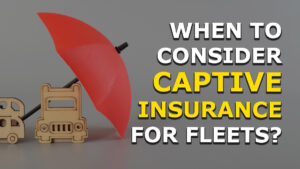
Trucking insurance underwriters and the Federal Motor Carriers Safety Administration (FMCSA) have very similar roles.
Both underwriters and the FMCSA want to make sure that commercial motor carriers and drivers are safe enough to be on the roadway. If the safety risk is too high, you will have to pay.
For insurance, this means your premiums will increase or your insurance provider may cancel your policy. The FMCSA will issue a DOT audit and look for any violations in your company records.
However, before your insurance rates are impacted or an audit is scheduled, the FMCSA begins the CSA intervention process with a warning letter.
A warning letter means your safety risk is not yet considered severe enough to require the FMCSA to get involved and force correction.
This is a carrier’s chance to improve their safety performance and compliance without further intervention from the FMCSA.
Learn More How Exceeding a BASICs Intervention Threshold will trigger a warning letter
So, what do you do if you receive a warning letter?
First, be sure to read the warning letter carefully.
The letter identifies which area is at high risk in your safety performance, explains how to access your safety record, and outlines the consequences if you do not improve.
This is a simple roadmap for your fleet to start fixing the issues.
Second, develop and execute strategies that will make your operation compliant with the safety regulations outlined.
This can also be a wake-up call for you to start looking into other area safety and compliance that may be falling behind.
Remember, after a warning letter is issued, the FMCSA will continue to monitor your safety performance and compliance through its SMS. If you do not improve, they may investigate your company further.
So, conduct an internal mock DOT audit yourself or use a third-party to comb through your records to look for potential violations.
If you do not create a plan now and your safety performance worsens, a DOT audit may require you to create a Safety Management Plan (SMP) to address corrective actions anyway.
This is when it will be too late and your safety scores will be hit, violations will be on record, and underwriters will use this data to increase insurance premiums at renewal.
Third, do not just “meet” the DOT regulation minimum.
Create strategies and a mindset that will ensure your fleet’s safety and compliance is always ahead of the FMCSA.
This may mean:
- Utilizing the tools available with your ELD data
- Establish a proactive approach to driver and fleet management training
- Go above and beyond in your new driver hiring and on-boarding process
- Continually monitor your CSA score and correct any wrong information with the DataQ process
- Set up a vehicle preventative maintenance schedule, and
- Train drivers on proper pre and post-trip inspections
Together, these programs will keep your fleet in compliance with the DOT regulations and will help tell a good safety story to underwriters.
Need a quote?
If you are interested in a quote, please call CNS Insurance at 717.625.0066, email us at info@cnsinsures.com, or fill out a quick quote form to get started with the best trucking insurance rates.t





